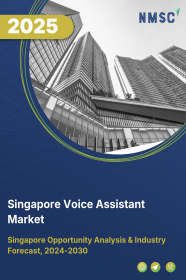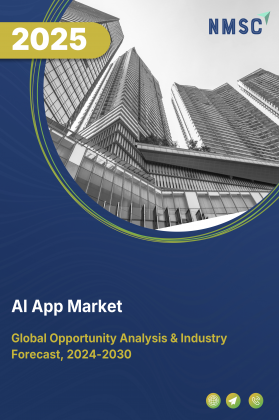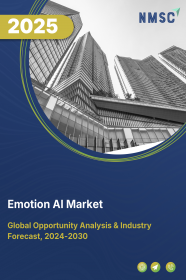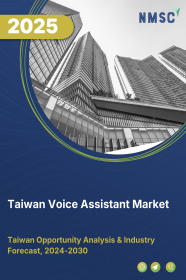
Singapore Voice Assistant Market by Offering (Hardware (Mobile Device, Smart Speaker, In-Vehicle Assistance, & Other Devices), Software (Integrated, & Standalone), and Services (Support & Maintenance, & Consulting)), by Device (Mobile, PC/Laptop, & Tablet), by Technology (Speech Recognition, & Voice Recognition), by Age Group (Millennials, Generation Z, Generation X, & Baby Boomers), and by Application (Telecom, and Others) – Country Opportunity Analysis and Industry Forecast, 2025–2030
Industry: ICT & Media | Publish Date: 17-Jun-2025 | No of Pages: 261 | No. of Tables: 214 | No. of Figures: 99 | Format: PDF | Report Code : IC3386
Industry Overview
The Singapore Voice Assistant Market size was valued at USD 131.3 million in 2024, and is predicted to reach USD 627.3 million by 2030, at a CAGR of 29.7% from 2025 to 2030. The high internet penetration and accelerating digitalization in Singapore are driving widespread adoption of voice assistants.
However, rigorous regulatory issues in Singapore such as data privacy and security, hamper the voice assistant market growth in Singapore. On the other hand, with the inclusion of hyper-personalized services in virtual assistant devices creates future growth opportunities for the sector.
High Internet Penetration is Driving the Singapore Voice Assistant Market Demand
High internet penetration in Singapore boosts the demand for voice assistants as it provides a solid base on which these technologies could easily function and be accessed. This widespread connectivity facilitates effortless integration with smart devices, further increasing user convenience and promoting more widespread adoption of voice-enabled services.
The World Population Review report says that the internet penetration in Singapore amounted to 94.29 percent in 2023. Such widespread connectivity allows users to use virtual assistants for real-time information retrieval, online shopping, digital payments, and smart home management, finally propelling its adoption across the nation.
Increasing Digitalization and Technology Adoption Boosts the Singapore Voice Assistant Market Growth
The wave of digitalization and the infusion of technology occurring in the country present it with an ambiance for its population to become technology literate; hence the market growth is enhanced. According to the International Data Corporation (IDC), Singaporean spending on artificial intelligence (AI) is likely to reach more than USD 3.5 billion by the year 2026, a figure that is close to triple the USD 1.2 billion spent in 2022. This huge investment is proof of a huge interest in embracing advanced technology that will enable voice assistants to be widely implemented across industries in the nation.
Rigid Data Privacy and Security Laws is Limiting the Singapore Voice Assistant Market Expansion
The voice assistant market growth is hindered by stringent regulations in Singapore posing data privacy and security-related hurdles with complex compliance requirements than operating costs. Thus, companies to make sure that their virtual assistants conform to local laws, including those of the PDPA, conceivably raising their operational costs. Such regulatory constraints discourage new entrants in the market and slow innovation, limiting the overall pace of expansion of virtual assistant technologies in the country.
Additionally, companies need to spend on strong data security measures, cloud storage that is secure, and localized AI models in order to meet regulatory requirements, further driving development time and expense.
Future Market Growth Being Driven by Hyper-Personalized Service Integration
The adoption of hyper-personalization services creates future growth opportunities for the Singapore voice assistant market trends with increasingly tailored user interfaces that make the interaction even easier for users.
Personalized recommendations, pro-active alerts, or even context-aware responses are related to the use of the software using the database in processing the users' information, which seen to increase the level of engagement and satisfaction that the users own.
For instance, in January 2025, Lucid Motors and SoundHound AI introduced a voice assistant called Lucid Assistant to simplify hands-free car travel. Natural speech from passengers and drivers used to command the car with an under-the-hood wake-up voice phrase such as, hello Lucid.
Hyper-personalization will allow virtual assistants to suggest playlists based on listening history learned through history listening, purchasing grocery items that were already purchased, or fitness advice based on individual health goals. Hyper-personalized virtual assistants will be the unmatched standard solution in massive fields-spanned from smart homes to health care and retail-that will drive future market expansion.
Competitive Landscape
The promising players operating in the Singapore voice assistant industry includes Amazon Inc, Meta Platforms, Inc, Microsoft Corporation, Apple Inc, IBM Corporation, Samsung Electronics, Alibaba Group Holding Limited, Orange SA, Verint Systems Inc, OpenAI, Swann Security, Xiaomi Corporation, Zirtual, Nokia Corporations, PolyAI Ltd., Hyperlink InfoSystem, Nuance Communications, SoundHound AI, Mihup.ai, Happyrobot, Bitonic Technology Labs Inc, Script Inc., Aiello AI Inc., VoiceKitt, RowBotAI, CE Info Systems Ltd., Mind-r.ai, Alphabet Inc, Continental AG, and German Autolabs.
Singapore Voice Assistant Market Key Segments
By Offering
-
Hardware
-
Mobile Device
-
Smart Speaker
-
In-Vehicle Assistance
-
Headphones
-
Other Device
-
-
Software
-
Integrated
-
Standalone
-
-
Service
-
Support & Maintenance
-
Consulting
-
By Device
-
Mobile
-
PC/Laptop
-
Tablet
By Technology
-
Speech Recognition
-
Voice Recognition
By Age Group
-
Millennials
-
Generation Z
-
Generation X
-
Baby Boomers
By Application
-
Telecom
-
Smart Home
-
Entertainment
-
Financial Services
-
Retail
-
Transportation
-
Hospitality
-
QSR/Restaurants
Key Players
-
Amazon Inc
-
Meta Platforms, Inc
-
Microsoft Corporation
-
Apple Inc
-
IBM Corporation
-
Samsung Electronics
-
Alibaba Group Holding Limited
-
Orange SA
-
Verint Systems Inc
-
OpenAI
-
Swann Security
-
Xiaomi Corporation
-
Zirtual
-
Nokia Corporations
-
PolyAI Ltd.
-
Hyperlink InfoSystem
-
Nuance Communications
-
SoundHound AI
-
Mihup.ai
-
Happyrobot
-
Bitonic Technology Labs Inc
-
Script Inc.
-
Aiello AI Inc.
-
VoiceKitt
-
RowBotAI
-
CE Info Systems Ltd.
-
Mind-r.ai
-
Alphabet Inc
-
Continental AG
-
German Autolabs
REPORT SCOPE AND SEGMENTATION:
|
Parameters |
Details |
|
Market Size Value in 2024 |
USD 131.3million |
|
Revenue Forecast in 2030 |
USD 627.3 million |
|
Value Growth Rate |
CAGR of 29.7% from 2024 to 2030 |
|
Analysis Period |
2024–2030 |
|
Base Year Considered |
2024 |
|
Forecast Period |
2025–2030 |
|
Market Size Estimation |
Million (USD) |
|
Growth Factors |
|
|
Companies Profiled |
30 |
|
Customization Scope |
Free customization (equivalent up to 80 working hours of analysts) after purchase. Addition or alteration to country, regional, and segment scope. |
|
Pricing and Purchase Options |
Avail customized purchase options to meet your exact research needs. |

















 Speak to Our Analyst
Speak to Our Analyst

























